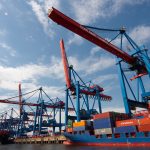Choosing Between FOB, FCA, and EXW Incoterms When Importing Cargo
This is a guest post by Joe Webster.
Most U.S. imports are transported via ocean freight or air freight. However, air freight primarily deals with shipments of perishable goods and other time-sensitive products. That, combined with almost double the shipping cost, means that the majority of imports arrive in the U.S. via ocean freight.
To get the best deal and have a smooth shipping process, it’s worth understanding common industry terminology used in freight shipping contracts. Two terms you’ll often run into are FOB or Free on Board and FCA or Free Carrier
Here’s what they mean.

FOB Obligations for Sellers
Sellers that agree to FOB terms on ocean freight shipping are subject to the following obligations:
- Origin freight charges
- Packaging
- Inland transportation in the cargo’s origin country
- Customs fees in the origin country
- Insurance is optional
FOB Obligations for Buyers
Buyers have very different obligations under FOB terms:
- Destination charges
- International freight
- Paying for the goods
- Customs fees in the destination country
- Inland transportation in the cargo’s destination country
- Paying additional duties and taxes
- Insurance is optional
Should You Use FOB When Importing Cargo Containers?
FOB is a commonly used agreement in international ocean freight shipping. You can see examples of the FOB incoterm in action and some alternatives on http://www.a1autotransport.com.
But it’s not the most efficient incoterm for containerized shipments, despite many businesses applying it to Chinese and other Asian imports.
The FOB incoterm shifts the risk from sellers to buyers. This happens as soon as the cargo is loaded on the ship. But containerized cargo can often sit in container terminals for days before it gets inspected and put on the shipping vessel.
For this reason, there could be a long period of inactivity and the cargo items could be stolen or mishandled while sitting in the container. A lot can happen during transport, loading, and even when sitting in an enclosed container awaiting further processing.
Moreover, containerized cargo remains enclosed until arrival and pickup. Identifying the time and circumstances of when the damage occurred, therefore, is challenging and makes it hard to identify the guilty or responsible party.
And under FOB incoterm obligations, sellers are liable for what happens before the cargo actually gets loaded onto the transport vessel.
FCA Obligations for Sellers
The FCA incoterm offers a different way of assigning responsibilities and obligations to sellers and buyers. Here are the obligations for sellers:
- Packaging
- Inland transportation in the cargo’s origin country
- Customs fees in the origin country
- Insurance (Optional)
- Goods delivery and document handling
FCA Obligations for Buyers
Here are the buyer’s obligations when agreeing to an FCA freight shipment:
- Destination charges
- International freight
- Goods payment
- Destination country customs fees
- Securing inland transportation at the destination
- Paying additional duties and taxes
- Insurance (Optional)
Should You Use FCA When Importing in Cargo Containers
FCA agreements make the seller contractually obligated to deliver the goods to the buyer’s preferred carrier at a specific location. Usually, this means delivering to a carrier hub or port. Furthermore, sellers are responsible for making customs payments.
However, the risk is shifted from sellers to buyers after the cargo reaches the buyer’s designated location. This means there’s more accountability during the entire logistics process of moving cargo from point A to B, nationally and internationally.
FCA is a more suitable, or at least versatile, option when importing containerized cargo.
But it’s not just a more beneficial agreement for buyers. Sure, buyers have a guarantee that the loading process is handled professionally and that someone is clearly responsible and liable for damages. It also saves them time and money securing other loading services, especially internationally.
Yet sellers also benefit from the FCA incoterm. It clarifies each party’s involvement at every stage in the shipping process. Moreover, it basically makes shippers responsible for loading containerized cargo.
EXW Obligations for Sellers
EXW or Ex Works is one of the most straightforward choices for sellers, given the few obligations involved:
- Preparing documents and goods for delivery
- Packaging
- Wrapping
EXW Obligations for Buyers
Buyers have more obligations under an EXW incoterm than FOB and FCA agreements for containerized cargo:
- Destination charges
- International freight
- Goods payment
- Destination country customs fees
- Securing inland transportation at the destination
- Paying additional duties and taxes
- Inland transportation in the cargo’s origin country
- Customs fees in the origin country
Should You Use EXW When Importing Containers?
The EXW incoterm is preferred by exporters and sellers with minimal experience in international shipping. Their responsibilities and obligations are easy to meet, and most of the risk is shifted to the buyer.
But that doesn’t mean buyers get a bad deal. On the contrary, experienced buyers often appreciate the additional control they can exercise over the freight shipping process. They’re in charge of everything, from selecting shippers to negotiating rates.
In theory, a buyer with enough industry experience and connections could profit more from importing under the EXW incoterm. On the other hand, someone without importing and international maritime shipping knowledge may prefer an FCA or even FOB incoterm.
These alternatives shift the risk to and from the buyer and seller at different stages of the shipping process. Therefore, the two parties can complement each other and share more responsibilities as well as risks.
Choose Your Incoterm Carefully
Using the most beneficial incoterm for international containerized cargo shipping is essential for both buyers and sellers. Each incoterm sets clear contract terms and outlines the obligations, responsibilities, and liabilities for all parties involved.
Selecting an incoterm that fits your business is essential for maximizing profits, limiting risks, and getting peace of mind on complex logistics matters. Every business may have unique freight shipping requirements. Every seller might have their own preferences or limitations when it comes to being involved with international shipping.
Understanding the incoterms will help you negotiate better deals and ensure the safe and timely transport of your goods from foreign countries to domestic soil at a preferred destination. Furthermore, working with professional shippers can help you navigate international shipping logistics and make better business decisions.
This was a guest post by Joe Webster.
Author Bio
Joe Webster began his journey in the auto transport field by attending the University of Southern California (USC), where he graduated with a Bachelor of Business Marketing.
After college, he started his career in the auto transport industry from the bottom up and has done virtually every job there is to do at A-1 Auto Transport, including but not limited to: Truck Driver, Dispatch, Sales, PR, Bookkeeping, Transport Planner, Transport Manager, International Transport Manager, Brokering, Customer Service, and Marketing. Working with his mentor Tony Taylor, Joe Webster has learned the ins and outs of this industry which is largely misunderstood.





